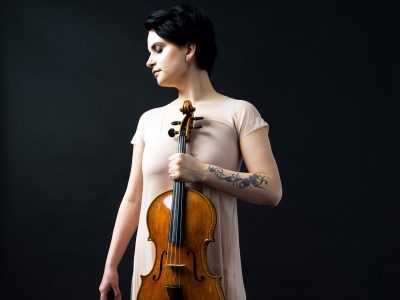- News
- Compositional perspectives: McKiver, Chang, Sokolović
Compositional perspectives: McKiver, Chang, Sokolović
Violist Marina Thibeault is renowned for her elegant and engaging musicianship. Equally impressive are the composers whose pieces she brings to life in her Dot Com Series concert premiering April 9 – Melody McKiver, Dorothy Chang, and Ana Sokolović. Keep reading for a closer look at these three distinctly unique creators – their work and their sources of inspiration.
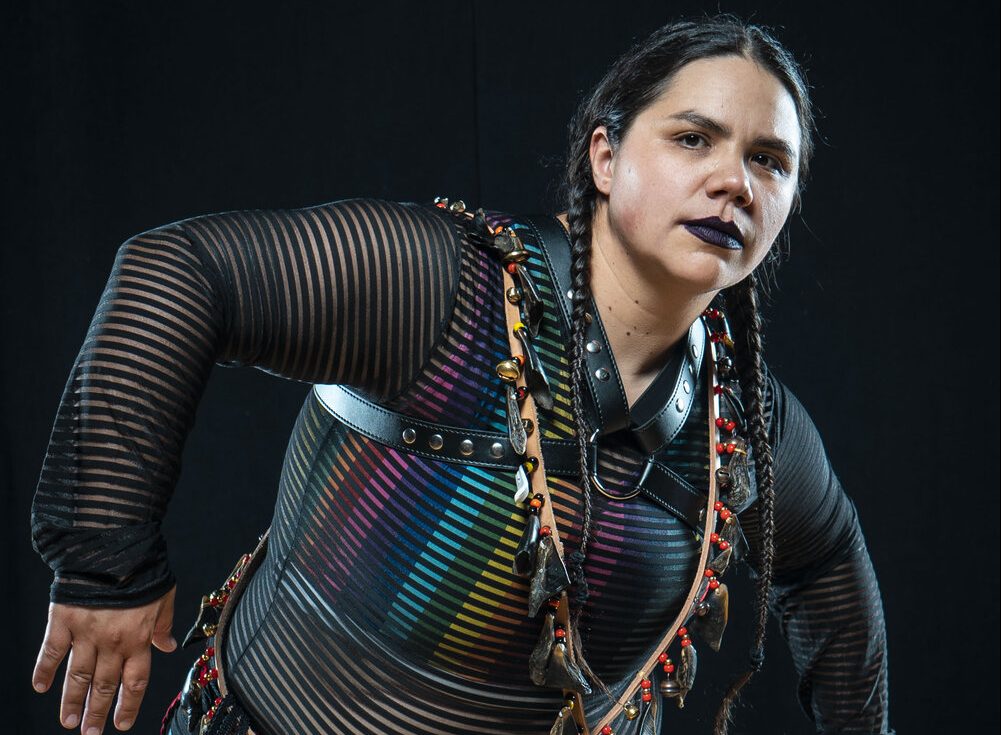
From composition to electric viola performance to activism, Anishinaabe artist Melody McKiver is an unstoppable force. With a master’s degree in ethnomusicology, journalism background, and experience as a youth worker, Melody brings a wealth of unique perspective to their music.
Initially a violin player, McKiver switched to the viola after discovering what she refers to as the “queer” musical space it occupies, as both a solo and collaborative instrument with a range comparable to McKiver’s own tenor vocals.
“Once I was cursed to be a more creative musician in university and not sticking strictly to the classical material but learning how to improvise, learning how to work with electronics — an improvisational instrument like the viola can kind of shuttle all that baggage.”
Melody McKiver (CBC)
McKiver’s compositions are not easily separated from their advocacy work. With the 2019 album Odaabaang, McKiver engaged community in art creation. Using interviews with Anishinaabe elders, the project explores intergenerational memories through a personal lens.
Motivated by their own experiences with music and identity, McKiver is also an important voice of advocacy for youth and Indigenous inclusion in classical music. They have spoken out about the challenges faced by LGBTQ2S youth in rural and remote communities and fought for more accessible paths to music training.
"One example that's become almost cliché in Canadian music is where Indigenous people aren't consulted in the telling of our own stories…We are dealing with a lot of issues of appropriation: so both recognizing the contributions of Indigenous musicians in the classical music world as well as addressing the cultural appropriation that has become really foundational to major institutions."
Melody McKiver (CBC)
This concert features pieces from McKiver’s debut EP, Reckoning. Originally composed as part of Article 11’s multi-media theatre piece of the same name, Reckoning addresses residential schools, the truth and reconciliation commission, and the fallout that has taken place since. The EP is dedicated to McKiver’s grandmother who was a residential school survivor.
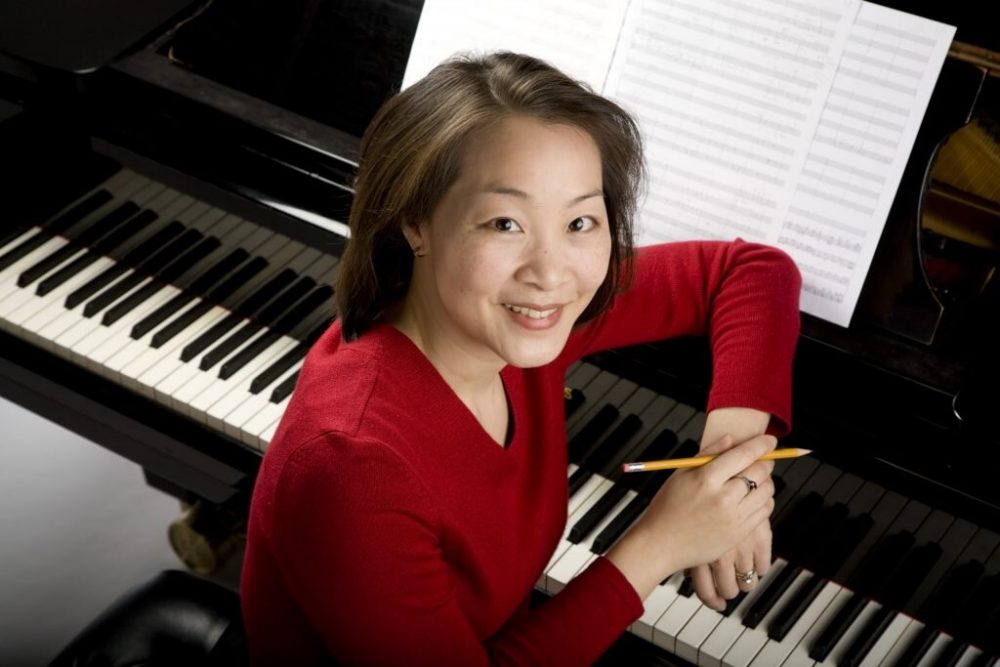
Well-known as a prolific composer and a professor at the UBC School of Music, Dorothy Chang’s works range from solo, chamber, and large ensembles to theatre and dance collaborations.
American-born with a Western musical education, Chang remembers initially having only a “filtered” familiarity of Chinese music through her first-generation parents. She composed her first work for traditional Chinese instruments in 2003, bridging eastern and western musical cultures and embracing Vancouver’s knowledgeable community of Chinese traditional music artists.
“I always felt there was something missing from my compositional voice, being completely trained in the western style, and yet in all other aspects of my life I feel there is a good balance between the east and west.”
Dorothy Chang (Soundstreams)
Chang explores atmosphere, place, and ensemble in her work. In the 2013 commission Small and Curious Places, the novelty of the “mixed Chinese and Western ensemble” takes a backseat to the ensemble’s expressive potential, manipulated simply as a cohesive sound source. The resulting collection of vignettes uncover ‘places’ – physical locations, places of mind, or emotional places – without any imposing narrative.
“In my music, I’m not interested in creating a musical depiction of the environment, but more the individual’s response to it. It all goes back to the idea of music coming forth from an emotion of a feeling or a state of mind.”
Dorothy Chang (True North)
Chang has been praised for her lush string writing that employs “a shimmering palette of colors and inventive development techniques” (The Daily Gazette). Never tiring of challenging her own imagination and that of her listeners, she composed Streams for solo viola as a further exploration of place and memory. Marina will bring her expressive nuance to the Canada Council-commissioned piece in this Dot Com Series event.
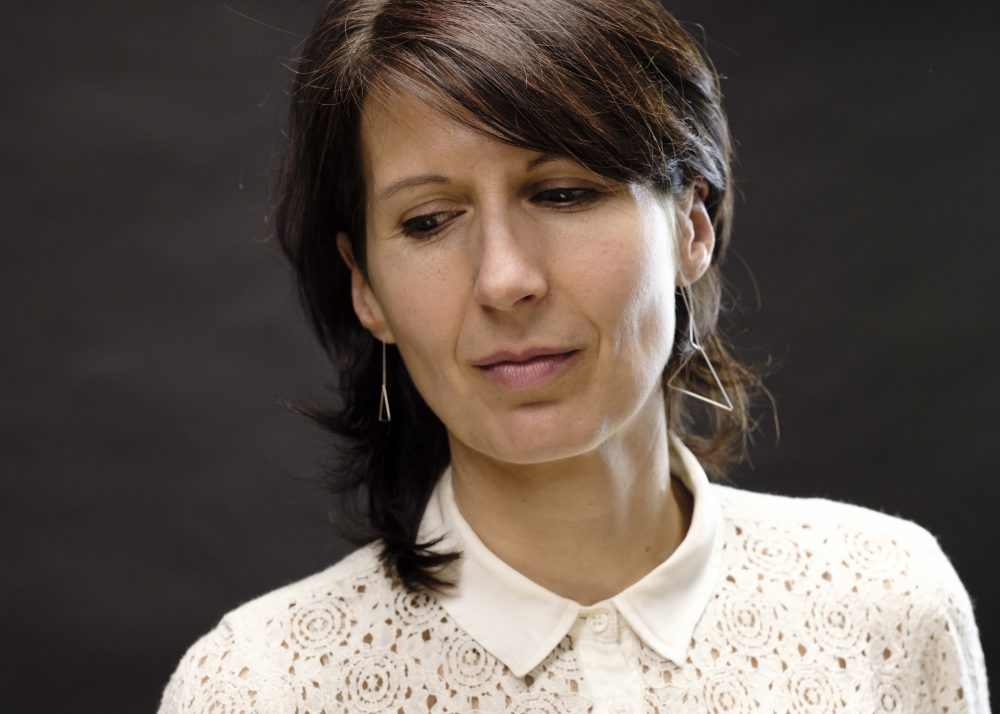
Ana Sokolović’s first arts experiences were in dance – before studying theatre and ultimately music, she was a student of ballet. Born in Serbia, she is often inspired by Balkan music – its “asymmetrical” folk rhythms and characteristic temperament that is simultaneously upbeat and melancholy.
Sokolović is brilliantly adventurous in her musical formats. Her catalogue includes chamber operas, works for dance, film, and theatre, and even a piece for an ensemble of eight voices, glockenspiel, and eight cellphones. Many of her vocal compositions, including “Dring, dring” – a music theatre piece inspired by how we use telephones – incorporate multiple languages. Her opera for solo voice (and optional saxophone) entitled “Love Songs” is sung in English, French, Serbian, Irish and Latin, and is laced together by interludes of the phrase “I love you” spoken in 100 different languages.
“I like to play – not to play music, necessarily, but to play as a child.”
Ana Sokolović (Boosey & Hawkes)
As composer in residence at the Montreal Symphony, Sokolović aims to “demystify” composition processes and truthfully communicate with audiences. Fascinated by the flexibility and intimacy of vocal writing in particular, she enjoys working with colours and other less-concrete aspects of music.
“I need challenges to create, and the main challenge in music is how to put something which is completely abstract in our head to paper.”
Ana Sokolović (Boosey & Hawkes)
Marina Thibeault’s performance features three songs from Sokolović’s Cinque Danzes – a work that invokes traditional Balkan music styles without directly quoting any songs. Also featured is “Prelude for Solo Viola”. This melismatic piece is specifically inspired by Balkan Romani music, written for the viola to evoke the darker sound of Romani violins and featuring characteristic micro-intervals.
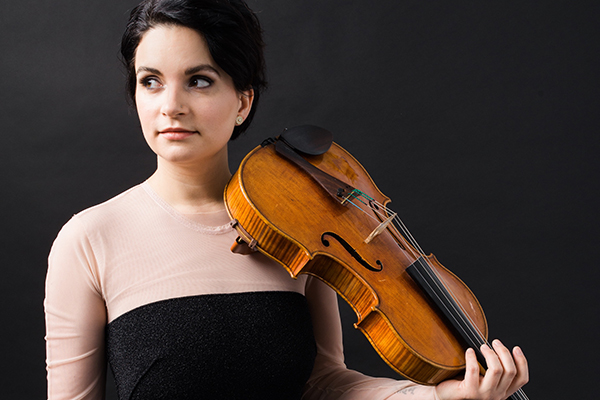
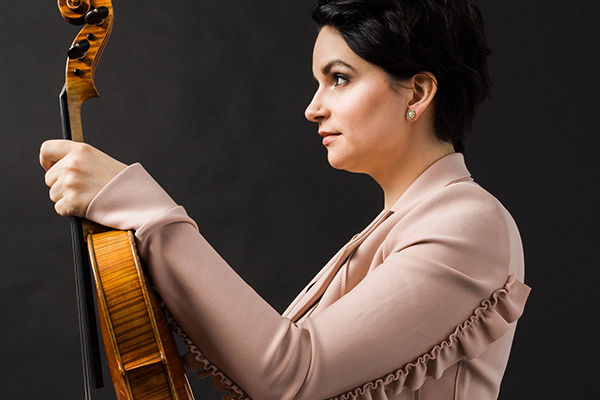
With such a roster of unapologetically original composers, no two pieces on Marina Thibeault’s program are remotely alike. To hear Thibeault’s unique interpretation of works by these three inspirational musicians, don’t miss this Dot Com Series presentation of Marina Thibeault, available to view from April 9, 2021.
About the author:
Taryn Plater is the Marketing & Communications Assistant at the Chan Centre, part of the UBC Work Learn program. She holds a double major in music and linguistics at UBC, as well as a Master of Management, and looks forward to playing a role in the future of the performing arts in Canada.

